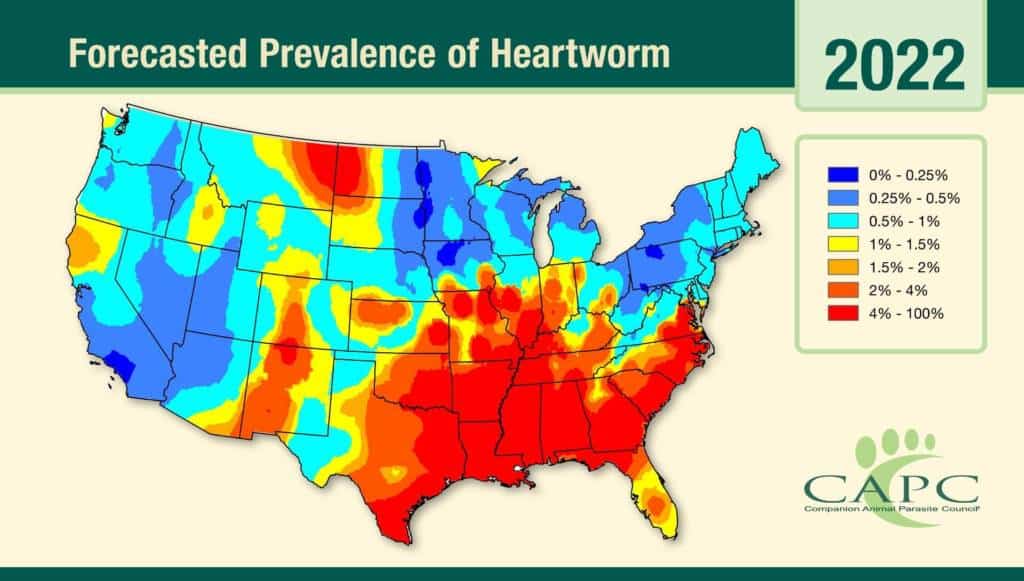The Companion Animal Parasite Council (CAPC) warns that, in 2022, the current rate of heartworm in dogs is much higher than normal. According to CAPC — an independent non-profit dedicated to raising awareness of the threat parasites pose to pets and their humans — the heightened risk is due to “the rehoming of pets, changes in distribution and prevalence of vector populations, changes in wildlife populations and their incursion into newly developed and reclaimed areas, changes in habitat due to natural or human-induced processes, and the short and long-term changes in climatic conditions.”
With this alarming risk in mind, RAWZ seeks to provide information around this possibly serious medical condition. This post is intended to educate readers about heartworm in general, rather than provide medical advice; always consult your pet’s veterinarian if you suspect your dog or cat has heartworm.
What Is Heartworm in Dogs?
As the name implies, a heartworm is a foot-long parasitic worm that takes up residence in the heart, lungs and vascular system of a host animal and carries the potential to cause extensive organ damage. Heartworm disease most notably affects dogs, cats and ferrets, but can also affect other mammal species, including wolves, coyotes, foxes, sea lions and, in rare instances, humans.
If treated, some animals — depending on their size, breed, disease progression and course of treatment — can live almost as long as their normal projected lifespan. If left untreated, however, heartworm disease is most certainly fatal.
Heartworm cases have been reported in all 50 U.S. states, but incidence varies based on local climate conditions. Mosquitoes are the primary carrier of the heartworm parasite, so outdoor pets are at the highest risk of contraction. However, since mosquitoes can enter the home, even indoor pets are at risk.
See the chart below, which shows the current prevalence of heartworm cases in the U.S. Keep in mind that these estimates may be conservative, since many cases of heartworm go unreported.
Source: CAPC
Where Is Heartworm Disease Found?
Rates of heartworm disease in dogs are highest in areas with large populations of mosquitoes, as well as in dense urban and suburban areas with large pet populations. CAPC currently observes high risk of heartworm infections along the Mississippi River, throughout the southern Midwest and along the East coast from Florida to southern New Jersey. As infections spread northward, CAPC predicts rates to increase in areas of the Northeast with higher population densities.
Unfortunately, the COVID-19 pandemic of 2020–2021 may have increased rates of heartworm disease, as health and safety precautions limited routine vet visits.
Though areas like the northern Midwest remain at low risk, CAPC cautions pet owners in all regions of the U.S. to take year-round preventative measures against heartworm infection, including routine testing. Even if you currently live in an area with low risk, the best thing you can do for your pet is to know the risks, recognize the signs and know how to prevent heartworm.
5 Early Signs Your Dog May Have Heartworms
While the severity of presentation may vary, the following can be early signs of heartworm disease in dogs:
- Mild, persistent cough
- Lethargy
- Easily fatigued
- Loss of interest in food or decreased appetite
- Unexplained weight loss
These symptoms are quite mild in early stages of heartworm disease, but as the condition progresses, a dog’s condition can worsen. Dogs with a serious heartworm infection can develop caval syndrome (CS), a life-threatening condition of late-stage infection that can lead to cardiovascular collapse.
There are four progressive stages of heartworm disease, with three occurring before the onset of CS:
- Stage 1: No symptoms or an occasional cough
- Stage 2: Mild to moderate symptoms such as becoming easily fatigued
- Stage 3: More prominent symptoms such as a sickly appearance, persistent cough and fatigue even after mild activity. Difficulty breathing, blindness, seizures and other signs of heart failure (such as blue gums, sleep-coughing or distended abdomen) may increase. In Stages 2 and 3 of heartworm disease, physical changes in the heart and lungs can be detected via chest X-rays.
- Stage 4 (caval syndrome): So many heartworms have infected the heart to the point where blood flow is disrupted, leading to heart failure and/or cardiovascular collapse. A telltale sign of CS is frequent fainting due to decreased blood flow to the brain.
When To Get Your Dog Tested for Heartworm
Dogs seven months and older can be tested for heartworms before being given preventative medicine. The sooner a dog is tested, the better; heartworm preventatives do not kill adult heartworms, but they can prevent larvae from growing and reproducing.
Whether or not your dog is already taking heartworm prevention medication, all dogs should be tested for heartworms annually. Work with your veterinarian to establish a testing schedule. More frequent or as-needed testing is recommended if:
- You forget to give your dog heartworm prevention
- Your dog’s heartworm prevention medication brand changes
- You and your dog travel to an area where heartworm is more prevalent
- Your dogs persistently displays of any of the above symptoms
Causes of Heartworm in Dogs
The sole cause of heartworm disease in dogs is the parasitic worm called Dirofilaria immitis, which is transmitted between mammals by mosquitoes. Mosquitoes serve as transitory hosts, since heartworms can reside in their bodies for a short time before being capable of causing infection.
Mosquitoes carry the parasite in their saliva and can transfer it to multiple animal hosts through single bites. When the worms reach a mammal host (in this case, the dog), they mature into adulthood, mate and produce offspring.
How Is Heartworm Disease Diagnosed?
Heartworm disease is diagnosed via blood tests, which can detect the presence of heartworms five to seven months following infection.
A heartworm antigen test can detect proteins released by adult female heartworms after a dog has been infected for five to six months. The primary recommended test, antigen tests can detect an infection from the presence of only one to three heartworms.
If there is any doubt about the results of an antigen test, a follow-up test can detect microfilariae, miniscule organisms produced when adult heartworms mate. The only reasons a microfilariae test may come back negative in a suspected case are:
- None of the adult worms are mature enough to mate.
- All the adult worms are of one sex so mating cannot occur.
- There are too few microfilaria in the bloodstream to be detected.
How to Treat Heartworm in Dogs
Heartworm treatment is two-fold: One type of medication kills the adult heartworms, and the other kills the immature microfilariae. Medication is administered at a veterinary clinic via a series of injections.
The drug, melarsomine (brand name Immiticide), has shown 95% effectiveness in dogs with heartworm. An initial dose is followed by 30 days of rest, then two final shots 24 hours apart. Dogs often stay overnight at the clinic while they await their third and final dose.
Rest is vital to successful heartworm treatment, so dogs being treated for heartworm need to be kept as quiet as possible during the 30-day waiting period, in order to minimize side effects. Side effects may include inflammation, allergic reactions or adverse effects from large numbers of dead worms being pumped out of the heart and into the lungs.
How to Prevent Heartworm in Dogs
The best treatment for heartworm in dogs is prevention! There are many products on the market that have received FDA approval, and all require a veterinarian’s prescription.
Typically, preventive medication is administered monthly in an ingestible form (both chewable and non-chewable tablets) or a topically applied liquid. There is also an annual or six-month injectable medication available which must be administered by a veterinarian. Speak with your vet about which option is best for your dog.
What to Feed a Dog with Heartworms
As advanced as animal nutrition science has become, addressing heartworm disease through nutrition alone will not eradicate this potentially fatal condition. However, diet can certainly help boost a dog’s immune system and energy levels and support their vital functions.
The job of any pet parent with an infected dog is two-fold: First and foremost, ensure the dog is getting adequate nutrition, namely enough calories and micronutrients. This can be challenging because of the dog’s reduced appetite, which makes flavor and digestibility two crucial components. According to Wormmy, a site dedicated to the study of worms and vermiculture, dogs with heartworm disease should eat a diet that includes raw meat, filtered water (to prevent contamination) and fresh produce. If a dog refuses to eat anything new or outside their normal diet, anything safe is acceptable — the primary concern is that the dog gets enough calories.
Second, it’s important to feed your dog foods that will boost their immune system’s ability to combat the disease and its symptoms. The following fruits and vegetables are beneficial to dogs battling heartworm:
Apples: Apples are great for dogs with heartworms due to their high levels of vitamin A, vitamin C and fiber. Apples in your dog’s diet may help repair damaged tissue and blood vessels and support the health of their vital organs.
Banana: The vitamin C in bananas can help minimize the impact of other diseases in a dog infected with heartworms.
Blueberries: Heartworms damage cells throughout a dog's body, but blueberries may help mitigate some of this damage.
Brussels Sprouts: These green leafy sprouts can improve a dog’s pain tolerance when dealing with the symptoms of heartworm infection.
Broccoli: A fantastic source of vitamin C, broccoli supports healthy blood vessels, bones and skin.
Cantaloupe: With high water and soluble fiber content, cantaloupe can help soften bulky stools and make them easier for a dog to pass.
Celery: Celery is great for heart health, keeping this vital organ as healthy as possible despite a heartworm infection.
Cucumbers: Cucumbers are packed with potassium, copper, magnesium and biotin as well as vitamins K, C and B1, which helps with healthy blood clotting. Heartworms can cause damage to a dog’s stomach, resulting in internal bleeding; blood coagulation can prevent internal hemorrhages.
Pumpkin: Pumpkin can help dogs with heartworm by preventing diarrhea, easing constipation, improving digestion and even boosting appetite.
Common Misconceptions About Heartworm in Dogs
With such serious consequences and prevalence, it’s critical to dispel any misinformation out there about heartworm disease in dogs.
- Indoor pets are not at risk.
Anywhere that disease-transmitting mosquitoes can appear puts dogs and other pets at risk for infection.
- Heartworm disease is just a summertime issue.
Although heartworm transmission is much more common during warmer months, mosquitoes have evolved to be quite resilient, which makes heartworm infections a year-round risk in any climate.
- Heartworms are contagious.
Unlike a cold or the flu, heartworms are not contagious between animals. Heartworm larvae reside in the blood of infected animals and can only be spread through a mosquito bite.
The best preventative measures pet owners can take against heartworm disease is to educate themselves about the risks. Most importantly, you can support your pet’s optimal health no matter what!
Make sure your dog or cat is up-to-date on their heartworm tests and preventative medications and support healthy eating with a minimally processed diet full of essential nutrients and delicious, all-natural proteins.
FAQs about Heartworm Disease in Dogs
Q: How can my dog get exercise with heartworms?
A: To minimize post-treatment side effects or complications, slow-paced leash walks are generally well-tolerated by dogs with heartworm disease. Additionally, the use of vet-approved chew toys can provide dogs a bit of energy release and stimulation. During feeding times, maze-style puzzle dishes can provide much-needed mental stimulation to keep a dog’s mind active. And never underestimate the calming effects of human touch!
Q: Can heartworms be transmitted from a mother dog to her puppies?
A: Transmission of the heartworm parasite requires a mosquito bite, so mothers will not pass on the disease to their puppies. However, microfilaria can pass by blood from mother to puppy. Fortunately, if the puppies receive their first dose of heartworm preventative soon after transmission (and if they are at least seven months old), these microfilaria will die.
Q: Are pain medications needed during heartworm treatment?
A: It is very common for dogs to experience swelling or discomfort at the medication injection site. The associated pain can typically be managed using careful injection technique; if there is a concern, the risks associated with local anesthesia far outweigh the potential side effects. Some pain medications can be prescribed if deemed necessary by a veterinarian.
Q: Can humans get heartworms?
A: Heartworm disease in humans is extremely rare, since the parasite is not likely to survive in a human’s bloodstream. Heartworms most commonly affect dogs, cats, ferrets, wolves, coyotes, foxes and sea lions.
For more heartworm resources and frequently asked questions, visit heartwormsociety.org.






